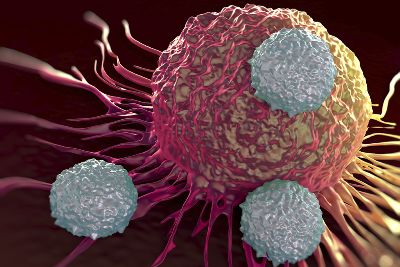
Illustration for T-cell therapy against leukemia (spectrumhealthbeat.org)
Supreme Court Justice Ruth Bedar Ginsburg had surgery for colon cancer in 1999 and again for pancreatic cancer in 2009, yet, at age 85 she is a remarkable survivor and contributor to our nation's judicial system. Carol Martin, a 67-year-old Harvard research administrator, working again though with advanced inoperable pancreatic cancer, was given at most two or three months to live a couple years ago and is not only still kicking but recently was successful in finishing the Boston Marathon, and this despite severe winds and rain on race day. A member of my mystery book discussion group is intelligent, articulate, independent, and cancer free after, years ago, being diagnosed with the highly aggressive kind of brain neoplasm that killed both a brother and a cousin of mine. Journalist Susan Lisovicz is still writing articles and doing well though found last year to have advanced ovarian cancer. These and many other perhaps surprising stories of living on despite the statistical probabilities not only give hope for folks newly diagnosed with end stage cancers but are as well providing a gradually increasing amount of valuable scientific information for the ongoing medical fight against this kind of disease.
 Illustration for T-cell therapy against leukemia (spectrumhealthbeat.org) |
Science and medicine are seeking such answers from a number of cooperative individuals each of whose existences would seen to so defy the odds as to be beyond normal explanation. Together, they form a network, specifically the Network of Enigmatic Exceptional Responders (NEER), a Harvard Medical School based project.
The endeavor is unique in various ways. It has over 100 participating responders, has pharmaceutical company involvement, is supported by huge, never before possible data crunch computing, and does not keep medical records from the patients themselves but allows them to have everything, be fully informed, and even pass their updated histories along to other doctors or similar research centers if they wish.
For participants, an added inducement for cooperating in the NEER project may be a sense of giving back, contributing to possible means to breakthroughs on the individual level, for others lucky enough in their own lives to profit from what is learned, and eventually perhaps for the wider war on cancer as well.
The professionals want to gather information too about people whose cancers result in profoundly short sustenance of quality living and so massive system failure abruptly following dire diagnoses. Both ends of the spectrum can offer vital data. Why is it that for some the decline following an onset of "terminal illness" is virtually immediate while for others it is so gradual as to almost seem to not be occurring at all? Hopefully the NEER project and others like it can in the next few decades increase the amazing successes on the positive end of that continuum while at the same time decreasing the numbers of those who survive only days or weeks after these terrible diagnoses.
Primary source: What Can Cancer Specialists Learn From Patients Who Beat The Odds? Carey Goldberg in www.npr.org; June 27, 2018.